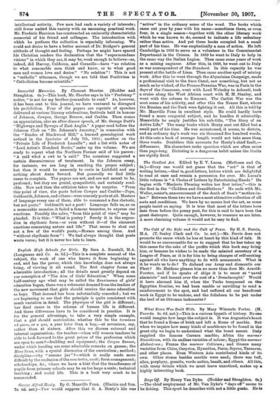Immortal Memories. By Clement Shorter. (Hodder and Stoughton. 6s.)—This book,
Mr. Shorter says in his " Prefatory " notice, " is not for my brother-journalists to read." As, however, it has been sent to this journal, we have ventured to disregard his prohibition. Four of the papers are reprints of speeches delivered at various literary celebrations, festivals held in honour of Johnson, Cowper, George Borrow, and Crabbe. Then comes an appreciation, also an after-dinner speech, of Mr. George Dutt's "Highways and Byways of East Anglia." A paper read before the Johnson Club on " Dr. Johnson's Ancestry," in connexion with the " Reades of Blackwood Hill," a learned genealogical work noticed in the Spectator of July 7th, 1905 ; another on the "Private Life of Frederick Lassalle" ; and a list with notes of " Lord Acton's Hundred Books," make up the volume. We are ready to repeat what the Northern Farmer said of his parson: " A said whot a owt to 'a said." The occasions suggested a certain discursiveness of treatment. In the Johnson essay, for instance, we are long in reaching the proper subject ; but then it would be unseemly to orate in Lichfield and say nothing about Anna Seward. But generally we find little cause to complain. The papers are not, and are not meant to be, profound; but they are genial, sympathetic, and certainly read- able. Now and then the criticism takes us by surprise. " From this point of view, the poets before Cowper and Crabbe—Pope, Goldsmith, Johnson, and others—were scarcely poets at all. Masters of language every one of them, able to command a fine rhetoric, but not poets." Goldsmith not a poet! Language fails us, as on a memorable occasion it failed a famous teamster, to express our emotions. Possibly the salvo, "from this point of view," may be pleaded. It is this: "What is poetry ? Surely it is the expres- sion in rhythmic form—or even without it—of the sincerest emotions concerning nature and life." That seems to shut out not a few of the world's poets,—Horace among them. And "without rhythmic form" ! We had always thought that poets wrote verse; but it is never too late to learn.


















































 Previous page
Previous page